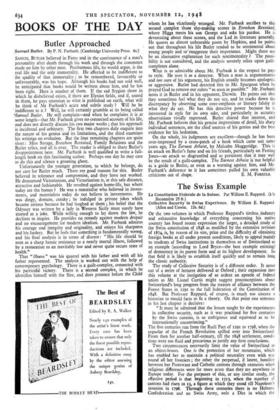BOOKS OF THE DAY
Butler Approached
SAMUEL BUTLER believed in Fame and in the continuance of a man's personality after death through his work and through the comments made on him by other men. Posthumous life, he would argue, is the real life and the only immortality. He affected to be indifferent to the quality of that immortality • to be remembered, favourably or unfavourably, was his hope. Although his books had not sold well, he anticipated that books would be written about him, and he has been right. Here is another of them. If the sad Stygian shore in which hp disbelieved exists, if there are Elysian fields, and if, seated in them, he pays attention to what is published on erth, what will he think of Mr Furbank's acute and subtle study ? Will he be indifferent to it ? Well, he will certainly grumble at its being called 'Samuel Butler. He will complain—and when he complains it is at some length—that Mr. Furbank gives no connected account of his life, and does not directly discuss his two major works ; that his approach is incidental and arbitrary. The first two chapters duly enquire into the nature of his genius and its limitations, and the third examines his writings on evolution. But the four remaining chapters are quite short: Miss Savage, Erewhon Revisited, Family Relations and the Butler relics, and all is over. The reader is obliged to Share Butler's disappointment here. Mr. Furbank is well qualified to write a full- length book on this fascinating author. Perhaps one day he may care to do this and silence a groaning ghost.
Unfortunately the younger generation, to which he belongs, do not care for Butler much. There are good reasons for this. Butler believed in tolerance and compromise, and they have not worked. He denounced Victorianism, and Victorianism is, at this safe distance, attractive and fashionable. He revolted against home-life, but where today are the homes ? He was a materialist who believed in invest- ments, and materialists today do not believe in investments. He was dingy, demure, cranky ; he indulged in private jokes which became serious because he had laughed at them • his belief that the Odyssey was written by a lady in Western Sicily must surely have started as a joke. While willing enough to lay down the law, he declines to inspire. He provides no remedy against modern despair and no encouragement for modem idealism. Mr. Furbank admires his courage and integrity and originality, and enjoys his sharpness and his foolery. But he feels that something is fundamentally wrong, and his final analysis is in terms of disease : " His life should be seen as a sharp heroic resistance to a nearly mortal illness, followed by a restoration to an inevitably low and never quite secure state of health."
That " illness " was his quarrel with his father and with all his father represented. The analysis is worked out with the help of contemporary psychology. There is a guilt-complex, connected with his parricidal victory. There is a second complex, in which he identifies himself with the Sire, and does penance before the Child
whom he has vicariously wronged. Mr. Furbank ascribes to this second complex those shy-making scenes in Erewhon Revisited, where Higgs meets his son George and asks his pardon. He is
devastating about these scenes, and the Lad in literature generally. He quotes an almost unbearable poem by Hopkins, and he points out that throughout his life Butler tended to be sentimental about young people and to' exaggerate their importance. Might there not be an alternative explanation for such sentimentality ? The possi- bility is not considered, and the analysis severely relies upon guilt- complexes alone.
What is so admirable about Mr. Furbank is the respect he pays to style. He uses it as a detector. When a man is argumentative and not sure of his argument, his English usually becomes apologetic or aggressive. Butler had detected this in Mr. Spurgeon when he prayed God to remove our rulers "as soon as possible." Mr. Furbank notes it in Butler and in his opponent, Darwin. He points out that they sometimes feel what they do not say, and he tracks down the discrepancy by observing some over-emphasis or literary falsity in what they do say. He has this detective power because he is interested in style for its own sake, and particularly in accurate observations vividly expressed. Butler shared that interest, and Mr. Furbank believes that his precise impressions of detail, his sharp individual sentences, are the chief sources of his genius and the best evidence for his hedonism.
On the whole, his judgments are excellent—though he has been over-impressed by a cross-patch of a book which came out some years ago, The Earnest Atheist, by Malcolm Muggeridge. This is an attack on Butler's fame and on his friends, particularly on Festing Jones—an attack so disgruntled and so persistent that it may well be the result of a guilt-complex. The Earnest Atheist is not helpful as a guide to Butler, or even as a warning against him, and Mr. Furbank's deference to it has sometimes pulled his own valuable


































 Previous page
Previous page